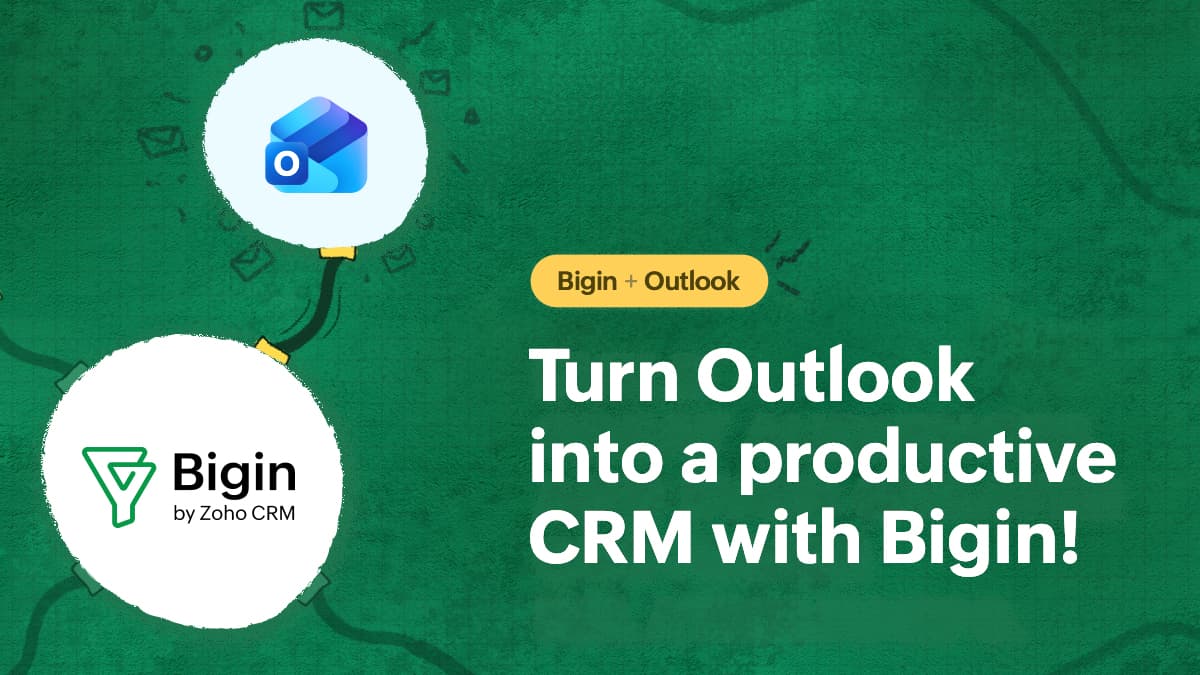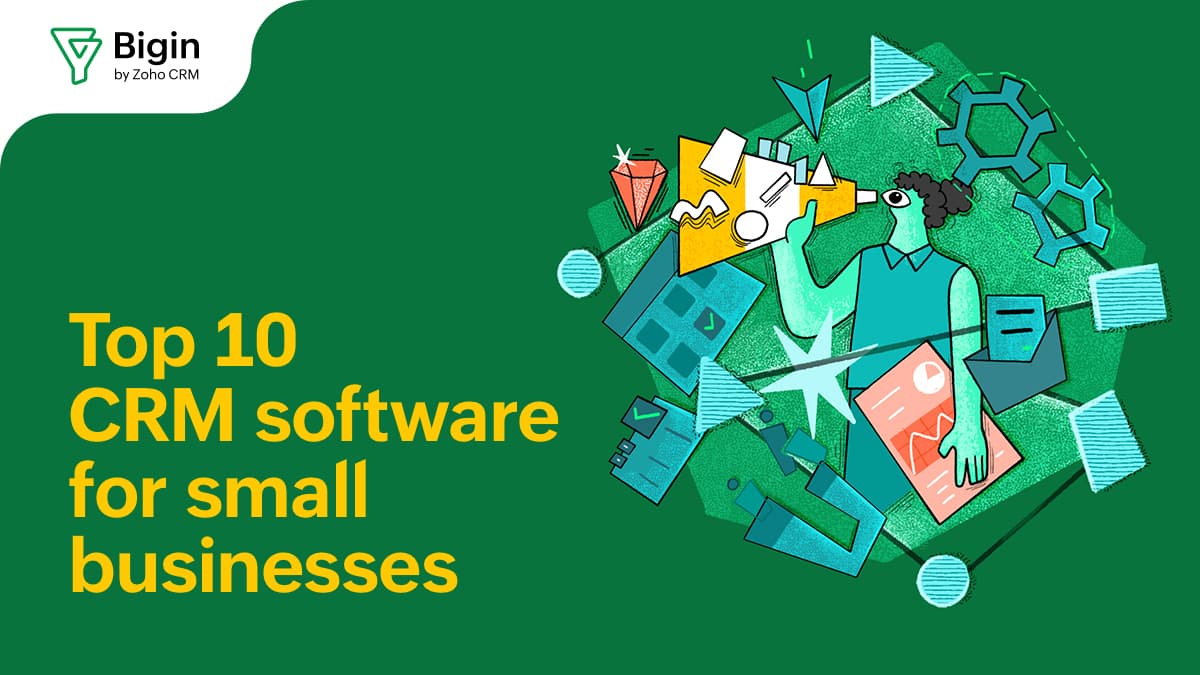- HOME
- Entrepreneurship
- Six things to look for in CRM for small businesses
Six things to look for in CRM for small businesses
- Published : June 10, 2022
- Last Updated : August 8, 2023
- 600 Views
- 7 Min Read

Are you a small business owner? Is your business ready for CRM?
You're at your desk and suddenly you remember a client—David from Zylker—had asked you to send something after your last call. As you're painfully drilling into the memory cells of your brain, you're distracted by a call from one of your team members. After the call, an email pops up on your screen—a prospect has requested a price quote for one of your products. While you're typing up a reply to the email, you remember another query from one of your clients, to whom you had promised a solution in a couple of hours—but that was two days ago and you completely forgot about it. Oops! Before you know it, it's time for your weekly assessment call with David and you still don't remember what he had asked you! Any of this sound familiar?
If you're a small business owner reading this and nodding along, heave a sigh of relief because it's not you—it's your business. As your business has grown, it has become more and more challenging to manage.
You've probably heard this a lot by now, but it's time for a customer relationship management (CRM) platform.
Chances are, you're even willing to consider it, but you're not exactly sure what you should be looking for before investing in one, and the choices in the market seem to be united on a mission to overwhelm you!
Here we'll discuss what you need to look for before you decide to invest in CRM software. You'll get an idea of which features and functionalities your business needs, as well as the aspects of your business that will see the greatest impact from your decision to adopt a CRM.
1. Identify small business friendly CRMs
Gone are the days when only large businesses needed or could afford CRM tools. An increasing number of small and medium enterprises are adopting CRM software to improve lead generation and customer retention.
Naturally, there are now many brands that offer CRM tools exclusively for small business enterprises. While the options are numerous, not all of them may be ideal for your business.
The first factor is to ensure you choose a CRM tool that's meant for small businesses. What do we mean?
CRM tools designed for large business enterprises are inherently very technical and complex because of the sheer volume of contacts, accounts, customers, and transactions that come into play. For small business enterprises, however, simplicity of features, ease of use, and applicability are what's most important.
But in order to cater to small businesses, some brands simply cut down on some of their upgraded features, which means they fail to address a lot of the business issues you're hoping a CRM can help solve. Sometimes, they even end up interfering with the effectiveness of the basic features. These tools aren't easy to use and end up further frustrating small business owners.
How do you pick a CRM platform that suits a small business like yours?
Most CRM brands offer free trials before signing up for a paid subscription. Explore every feature during the trial, being sure to note how simple it is to set up and how easily you and your team can adapt to using it.
You can also check the level of support and resources offered by a brand. By this, we don't mean just the customer support by way of live chat, helplines, emails, and so on. Some brands also offer self-help materials, including user manuals, tutorial videos, step-by-step guidelines, and other helpful resources that reduce your dependency on the company for assistance.
The greater the availability of such resources, the easier your transition to CRM will be.
Now, let's get more specific on what features you need to be looking at before making your choice.
2. How does the CRM software address your particular pain points?
While there are a handful of functionalities and features offered by every CRM platform, you need to be clear on what your priorities are.
For instance, your team may repeatedly miss out on project deadlines due to communication gaps between team members, whereas at another company, the problem might be managing client interactions. Clients may be contacting them randomly through multiple channels (email, WhatsApp, Slack, etc.), in which case it can be challenging to track and respond to all communications.
When you have such specific issues you need addressed, you have to explore the particular features that purport to resolve them.
In cases where your team interactions need improvement, check out the CRM features that help organize and manage activities. Consider these questions:
- How much of your activities can you manage within the CRM software?
- Does it enable you to automate repetitive tasks in your business?
- Does it help you prioritize tasks?
- Does it facilitate follow-ups and reminders?
In cases where you're looking to improve your client interactions, check out the pipeline features offered by the CRM and ask yourself the following:
- Does the pipeline feature comprehensively cover all the stages of your business?
- Does using the pipeline prevent missing out on leads and accidental deal closures?
- Is it easy to track leads between different stages?
- Can you customize the pipeline to suit the specific requirements of your business?
After assessing how the features offered address your particular pain points, you can make an informed decision as to which CRM software best suits your business.
3. Does it have customized options unique to your line of business?
CRM software sometimes offers customized features and functionalities to suit the particular requirements of certain businesses. For example, some feature sales pipelines with pre-filled custom fields, workflows for relevant and repetitive tasks, and so on.
With such options, the built-in features and functionalities already suit your business, so you don't have to spend any additional time setting up fields and stages in workflows and pipelines.
For example, Bigin by Zoho CRM offers pipeline options that are customized to suit law firms, educational institutions, PR agencies, and more.
Alternatively, if you're someone who prefers to customize your pipelines and workflows to suit your business and team, ensure that the CRM allows customization.
For instance, you may want to clearly define your team members' level of access to and control over customer data, depending on their roles and functions. In such cases, you should look for CRM tools that allow you to customize roles (admin, manager, auditor, etc.) and thereby regulate access.
4. Don't be misled by numbers alone!
Companies price their CRM tools at competitive rates. As for the features offered, they may all sound identical to you, so it's only natural that you're drawn to the option that's most pocket-friendly. However, this is where many entrepreneurs are misled.
With a CRM, you may have to compare the features that get included within your subscription plan. Certain CRM tools that seem cost-effective often don't include the most useful features—in which case you just end up making multiple additional payments at a later stage so you can utilize the features and functionalities you required all along.
For example, if you have multiple products and thereby require multiple sales pipelines, and your subscription plan only includes a single pipeline, you'll be forced to pay for additional pipelines as "add-ons". In this case, you could compare the overall cost with other subscriptions that offer you multiple pipelines as part of the basic plan.
Cross-comparing features and pricing can help you make the choice that best suits your budget and business requirements.
5. Which CRM platforms are your peers and competitors using?
The ability to learn from others' mistakes makes for a prudent business person.
While the right choice in a CRM platform can make your life exponentially easier, the wrong choice can stick you with complicated software that you have no use for.
So do your own research but also ask around. With a steadily increasing number of CRM brands, and newer and better promises being made for small businesses, it's only natural for you to be overwhelmed and confused by the number of choices.
While it may not be feasible for you to have a trial for all the options in the market, you can find out from your networks and communities which CRM software worked for their business and, more importantly, which ones didn't—and why.
6. Consult your team
Even when you do everything else right, skipping this one step may affect your results. Discuss the options and consult with your team members about their preferences before deciding which CRM software to go for.
Introducing new systems may sometimes be met with resistance, initially, because unfamiliarity can lead to apprehension. Once they understand the benefits of CRM, they'll be a little more inclined to learn and adapt.
Listen to their suggestions and opinions, since they'll be the ones dealing with the software everyday, and ensure that you address their specific concerns while deciding on the CRM software you'll ultimately go with.
That's a wrap. With the range of options in the CRM market consistently expanding, consider the above factors before you decide to invest in a CRM platform; doing so will lead you to the choice most suited for your business.


